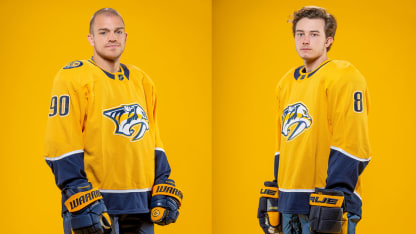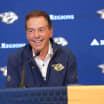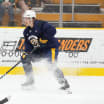Mark Borowiecki is well aware of his persona as a tough, tenacious, semi-toothless hockey player.
He said so over the summer when he
penned his own piece for NashvillePredators.com
showing his support of the LGBTQ+ community. But he also stated something else in that story - how he believes masculinity is best defined.
"But to me, true masculinity and true toughness comes when you're willing to put yourself out there in the name of acceptance and equality," Borowiecki wrote. "To me, that's toughness."
That mantra is also why he's not afraid to discuss his mental health either, an aspect of Borowiecki's life he's now giving the attention it deserves.
Borowiecki, Glass Open Up on Mental Health, Encouraged by Progress in NHL
Predators Players Discuss Individual Journeys, Now Ready to Embrace New Challenges and Compete for Nashville

© Nashville Predators
Last season, his first with the Predators after spending the first nine years of his career with Ottawa, Borowiecki dealt with ailments no one else could see from the outside. He knew things were bad, and a change was necessary.
Over the summer, after getting back to full health from a concussion suffered last March, Borowiecki released a statement on Instagram that read in part: "Earlier in the season, I missed a bit of time as well. I have alluded to some issues with mental health throughout my career, but have never been completely candid publicly. I have struggled with obsessive compulsive disorder throughout most of my career, and [I] needed to take some time to myself to get back to a healthy headspace… I'm not looking for sympathy or pity. I have an incredible life and I am incredibly fortunate and grateful. It is my hope that I can speak publicly and encourage other athletes to get the help they may need, and to not feel like they are alone or unable to seek help."
Borowiecki sought out that assistance and has noticed a monumental difference. Not only has he returned to peak physical condition, but the rugged blueliner has also refreshed his outlook and approach to the way he operates day-to-day no matter the assignment.
"I've always worked hard physically in the summers, and a sports psychologist I work with likened it to I do the physical reps, but have I ever really done the mental reps all summer to be able to be resilient and kind of handle adversity and stress and some of these things that I'm predisposed to?" Borowiecki said as Predators Training Camp began last month. "And I think I can honestly say I don't think I've put enough time into that in the past in my career. This summer is the hardest I've ever worked mentally, and I just feel so good. I know every player says, 'This is the best I've felt coming into camp,' but I'm not talking about skating or conditioning or anything like that, I'm just talking about me as a person this is the best I've been feeling. I've had summer skates where I've gone back home to my wife and just been genuinely pumped about how I felt out there and how excited I was to go to the rink and have an opportunity to play again. To have that feeling is huge. I've got a bit of a chip on my shoulder like I've got something to prove. Obviously, I didn't meet my expectations last year, but I'm just going to go forward now, and I'm really excited."
As a veteran player, Borowiecki knows what to expect when it comes to the grind of an NHL season. There are long days at the rink and even longer road trips, and while the lifestyle certainly has its perks, things aren't always easy, no matter the compensation, monetarily or elsewhere.
Over the past 18 months, mental health has been held in higher regard across everyday life, and Borowiecki has seen that come to fruition in his line of work - a fact he's grateful for and a stigma that's been released.
"I think a lot of it is learning about yourself and what works for you and what you need to handle these natural emotions that you're going to have," Borowiecki said. "It's training camp, the NHL is your job, your career, you're always going to be a little anxious, you're not going to eliminate that completely, but it's learning tactics and strategies that work for you to deal with, and then [channeling] that energy, positive or negative, into the right direction.
"As I've gotten older, I've learned what works for me, and this year I have the plan of how to deal with this stuff. It's not, let's just go by the seat of my pants and hope I can figure it out. Maybe that's worked in the past, but it didn't work for me last year. It was a lot of change, and it all just kind of ate me up. I've kind of tended to be a little more structured this summer and how I'm approaching things mentally, I just feel a lot more comfortable this year coming into camp."
Borowiecki's willingness to speak out on the subject has also made it easier for others around the League to do the same, like new teammate Cody Glass.
Acquired from Vegas in the offseason, the Predators are optimistic on the 22-year-old Glass and his abilities to be a productive centerman on a nightly basis. Glass is ready for the fresh start, too, especially after a tough couple of years that saw him not only deal with a pandemic like the rest of us, but also undergo, and then rehabilitate from knee surgery, the first major injury he had ever endured.
Because of the circumstances, Glass was always in Nevada and unable to return home to Canada and visit his family for two years, a fact that didn't help matters. Now, things are looking up in many aspects of his life, and he's got an improved perspective on the situation.
"You have your mental side where you kind of free up your mind during the summertime, but once you get the season started, it's hard to kind of go back to it and take your time off because you're always doing stuff at the rink, you're always working out, you're always skating; it's hard to kind of get alone time and talk to someone or do something like that," Glass said. "I feel like as a young kid in the League, you're scared to talk to people, and I feel like that's where I kind of went wrong. Maybe my rookie season I didn't really talk to anybody. I kind of kept everything to myself, but I feel like talking to other young kids, it's OK to talk to someone and get stuff off your chest, even if it's not a coach, if it's just someone away from the rink. I feel like that's a big part that's coming into our League right now. You see [Montreal forward] Jonathan Drouin, and he's kind of stepped out and said stuff about him and his mindset with everything. You need to take a step away [sometimes], but I feel like that's a big thing with hockey that people don't really realize."
Now healthy physically, Glass also knows the importance of taking care of his mental health as well, and he's pleased to see the progress that's being made in hockey circles on the subject while learning how to reach out for help on his own - and that includes his new team.
"I think it's getting a lot better now, especially in the dressing room," Glass said. "I feel like we have a very good system here, especially Nashville, with people to talk to, and that's what I've noticed right from the start. And there's a ton of people always reaching out to you, which is nice, and with this locker room, everybody feels so comfortable and it's so easy to talk to everybody. That's something I loved about coming to this dressing room, and around the League, I feel like more people are speaking out. That's a good thing for the League, because I think people just don't see it, and it does eat at people. Being in the NHL, you expect a lot of yourself, and you want to be that guy that plays a ton of years in the NHL. When it's not going your way, you kind of get down on yourself, and everybody starts getting down on yourself. It's a wild League, and I feel like just taking those moments to kind of take a deep breath and talk to someone goes a long way."
Borowiecki agrees, and even in the midst of training camp, before the regular season ever begins, the stresses of competing for a roster spot can take over at times. Now, it's all about managing the workload and finding balance in it all.
Glass and Borowiecki are 10 years apart in age, but they've both realized the importance of taking care of themselves, especially in their own headspace.
Because of that, they can truly say they're in the best shape of their lives.
"This is a mindset that I've kind of flipped," Borowiecki said. "You can't look at these challenges, these hard practices as obstacles, right? They have to be opportunities for you to get better and get ready for the season and an opportunity for you to impress people who are evaluating you. I think when we look at these tough days as opportunities, it kind of lightens the load a little bit and makes me realize that, 'Hey, this is a chance for me to go out here and prove myself and do good things and learn and be better as a player.'"


















